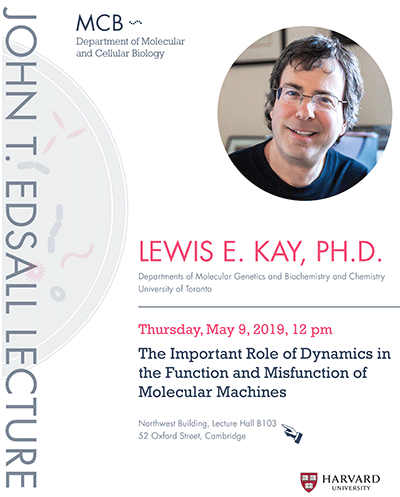Biophysicist Lewis E. Kay will deliver the 2019 Edsall Lecture on May 9 at noon in the Northwest Building, B103. His talk is titled “The Important Role of Dynamics in the Function and Misfunction of Molecular Machines” and will focus on tools his lab is developing for studying biomechanical dynamics in proteins.
Kay has devoted much of his career to opening up new applications for nuclear magnetic resonance (NMR) instruments in biology. Techniques he developed have enabled many researchers to probe changes to proteins’ structures and conformations, furthering our understanding of how proteins work.
Hailing from Alberta, Canada, Kay attended undergrad at University of Alberta in his hometown of Edmonton. He went on to earn a Ph.D. in molecular biophysics at Yale, before continuing on to a postdoc in Adriaan Bax’s lab at the NIH. In 1992, he returned to Canada as an Assistant Professor of Molecular Genetics at University of Toronto. Three years later, he attained the rank of full professor.
Though NMR spectroscopy has been a common theme in much of his research, Kay has studied several different proteins in varying contexts, ranging from neurodegenerative disease to cancer. One of his frequent collaborators is his wife, Dr. Julie Forman-Kay of Sick Kids Hospital in Toronto, who studies the role of disordered proteins in cancer and neurobiology.
Kay’s work with NMR and on protein dynamics has pushed the boundaries of the technique and enabled many researchers to “see the unseeable.” In 2011, The Journal of Biomolecular NMR published a special edition in recognition of Kay’s birthday. The editors wrote, “Lewis has consistently been a pioneer in the development of novel methods essential to increasing the size of proteins that may be studied by NMR.”
His work has also been influential outside of biophysics and chemistry. According to Google Scholar, his papers have been cited over 63,000 times, including about 15,000 citations since 2014.
His many honors and distinctions include the Nakanishi Prize from the American Chemical Society, the Gerhard Herzberg Canada Gold Medal for Science and Engineering, the Gairdner Foundation International Award, the Khorana Prize from the Royal Society of Chemistry, the Gunther Laukien Prize, the Favelle Medal from the Royal Society of Canada, and the Steacie Prize from the National Research Council of Canada.

The John T. Edsall Lecture is named for Harvard professor and biochemist John Tileston Edsall, who taught at the university from 1928 to 1973. Edsall, along with his colleague Edwin Joseph Cohn of Harvard Medical School, co-wrote the iconic biochemistry textbook Proteins, Amino Acids and Peptides as Ions and Dipolar Ions, which remained in print for decades. Though he was formally appointed at the Medical School, Edsall joined the Board of Tutors at the college in 1928, thereby encouraging interest in biochemistry among Harvard undergraduates. He officially left the medical school and joined Harvard College in 1954. Edsall’s most noteworthy roles include serving as Head Tutor from 1931 to 1968 and editing the prestigious Journal of Biological Chemistry from 1958 to 1967. He retired from teaching in 1973 but continued to conduct research at Harvard until the mid-1990s. Edsall passed away in 2002, a few months before what would have been his one hundredth birthday. The Edsall Lectures honors the legacy of this founding figure in the Harvard biochemistry community.
Kay’s Edsall Lecture will take place on (Thursday) May 9 at noon in Northwest Building, B103. The MCB community welcomes Professor Kay and is looking forward to hearing about his research!




